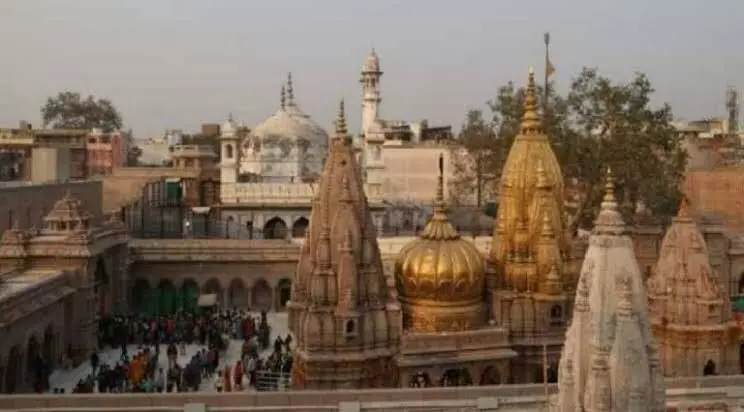Gyanvapi dispute: Hindu claims, Muslim side and complete history

The Gyanvapi mosque and Adi Vishveshvar temple, amid the claims of Hindus and Muslims, the Archaeological Survey of India (ASI) has completed the scientific survey of the Gyanvapi complex and submitted its report to the district judge's court in Varanasi.
The legal battle has reached such a level that a number of cases with various demands related to this matter have been filed in the district court, high court and Supreme Court.
Due to the matter being pending in court and keeping in mind its sensitivity, we have tried to summarize the claims and arguments related to this dispute so that you can understand it better and know the facts related to the events.
First came: temple or mosque?
If you try to go into the depths of the legal documents of both the mosque and the temple sides, you will definitely have a question in your mind that came first - temple or mosque?
And this is the cornerstone of the legal battle.
So let's know what the Hindu side says about the establishment and existence of the temple and what the Muslim side says about the existence of the mosque.
The temple side says that the temple of Lord Vishwanath was built about 2050 years ago by King Vikramaditya. There is a self-manifesting Jyotirlinga of Lord Shiva, also known as Lord Vishwanath, present in the temple since mythological times. This temple existed before the Muslim rulers ruled in India. According to the temple side, this Jyotirlinga is considered to be the most sacred of the 12 Jyotirlingas present all over the country.
The mosque side claims that the mosque is more than a thousand years old, where Muslims have been offering prayers every day.
The mosque side says that the structure present on plot number 9130 is called Alamgiri or Gyanvapi.
But where did the name Gyanvapi come from?
In this regard, the temple side believes that there is an ancient well in the present Gyanvapi complex and it was dug by Lord Vishwanath himself with his trident in Satyayuga and it is still present at its original place. The name of the well is Gyanvapi and the name of the entire complex is also Gyanvapi, in which the mosque is present today.
In his petition, the temple side writes that, “With the permission of Emperor Akbar, the reconstruction of the Kashi Vishwanath temple was allowed at the request of Saint Shri Narayan Bhatt and Narayan Bhatt built the temple with the help of his disciple and finance minister Raja Todarmal at the original place of the temple in the Gyanvapi complex.”
Did Aurangzeb order the demolition of the temple?
One of the most important claims made by the temple side is that the temple of Adi Vishwanath was demolished during the reign of Mughal ruler Aurangzeb and later a mosque was built on the same site. The temple side makes this claim on the basis of the book Masir-e-Alamgiri written by Saqi Mustad Khan, which tells the history of Aurangzeb's reign.
The temple side says that Masir-e-Alamgiri writes:
"On April 18, 1669, Emperor Aurangzeb received false information that foolish Brahmins teach satanic knowledge in Thatta (now in Sindh province of Pakistan), Multan and Banaras, which is also learned by Muslims along with Hindus."
It further writes:
"Therefore, Emperor Aurangzeb ordered the demolition of such schools and temples of the infidels and ordered the officials to impose a complete ban on idol worship."
About the demolition of the temple, it writes:
"On the 18th of Rabi-ul-Akhir, following the order of Emperor Aurangzeb, the royal officials partially destroyed the temple of Lord Vishwanath present in the Gyanvapi complex."
The temple side's lawyer Vijay Shankar Rastogi writes in his petition, "The events of the demolition of Vishwanath or Vishwaveshvar temple are mentioned in the Masir-e-Alamgiri, published in Arabic in 1871 by the Asiatic Society of Bengal."
About these claims of the temple side, the mosque side says, "No temple was demolished in compliance with the order of any emperor in 1669. The mosque has been in the possession of the Anjuman Intezamia Masjid and has never been in the possession of any other person or institution."
The mosque side says about the claims of the temple side, “The Hindu side claims that the order to demolish the
